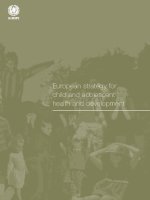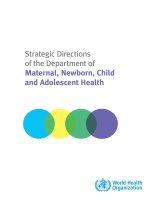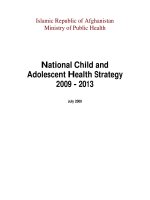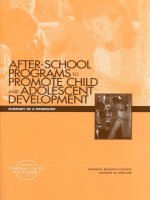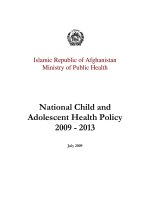child and adolescent counseling chapter 19
Bạn đang xem bản rút gọn của tài liệu. Xem và tải ngay bản đầy đủ của tài liệu tại đây (134.01 KB, 37 trang )
Chapter 19
Counseling Children with
Special Concerns
I have found the paradox that if I love until it
hurts, then there is no hurt, but only more
love.
Mother Teresa
© 2011 Brooks/Cole, A
Chapter Objectives
After reading this chapter, you should be able to:
•
•
•
•
•
Define child maltreatment, its causes, and protective factors
Explain interventions for child maltreatment
Discuss the difficulties of children of substance-abusing parents
Outline treatment for children and parents in alcoholic families
Explain children’s reactions to death and interventions for their
grief
• Talk about depression and suicide and responses
• Describe concerns of children in families and treatment options
• Discuss children with violent tendencies and ways to work with
them
© 2011 Brooks/Cole, A
Special Concerns
First Items
• A child may be in counseling a while before you
learn of these items
• All of them are under reported
• Duty to report
o
For abuse you only have to believe it was
possible
o
It’s not for you to decide
o
Call Child Protective Services or equivalent
© 2011 Brooks/Cole, A
Categories
• Child Maltreatment
• Substance Abuse in the Family
• Death and bereavement
• Depression and suicide
• Divorce and separation
• Children and violence
© 2011 Brooks/Cole, A
Child Maltreatment
• Physical abuse
o Beating, striking with an object, burning, biting
• Physical neglect
o Failure to provide basic needs: food, medical,
protection
• Sexual abuse
o Using a child for sexual gratification: range from
watching a child undress to rape
• Psychological abuse
o Chronic denigration of child, isolation, terrorizing,
excessive demands, parental violence and drug use
• Emotional neglect
o Failure to provide affection; failure to thrive
© 2011 Brooks/Cole, A
Physical, Psychological
Abuse
• Physical
o Long term effects not well understood
o 25% have serious MH issues: anxiety,
depression
o Overwhelming school problems, academic
failure
• Psychological
o Destructive effects have been documented
Multiple behavioral and MH problems
o Enlist the school in responding to the problem
© 2011 Brooks/Cole, A
Child Sexual Abuse
General counseling strategies
• Counselor must prepare for total
involvement
• Expect repeated testing of their caring
• Relaxation and visualization may help self
attitude
• Encourage good physical appearance and
self confident body language
© 2011 Brooks/Cole, A
Child Sexual Abuse
• Children are often guilt ridden
o
o
o
o
o
o
It is their fault that it happened (the abuser may tell
them this)
They feel they should have prevented it
Someone is in jail because they “told”
They may have had to tell the story too many times
Talking about the event may be its own trauma
Being removed from the home is traumatic
• Needs
o
o
o
Education on what is appropriate
Reassurance
Balance protective measures with trust in the world
© 2011 Brooks/Cole, A
Child Sexual Abuse
Child’s memory of abuse
•
•
•
•
•
•
•
•
•
•
Children’s memories are susceptible to manipulation
You are not trained to interrogate for sexual abuse but
you must report suspicions
Do not jump to conclusions
Do not ask leading questions (child will try to come up
with “correct” answer.
Get external corroboration
Pay attention to body language
Let the child tell her story
Be empathic but neutral (do not get upset)
Use clarification and summary skills
Use child's language
© 2011 Brooks/Cole, A
Children in Chemically
Dependent Families
• 8.3 million children in Americans live in an alcoholic
family
• Often left out of the parent’s treatment
• Compared with other children have significant risks
for mental illness, physical health difficulties and
learning problems
• Both physical and psychological needs have not
been met
• Child’s environment has been unpredictable
© 2011 Brooks/Cole, A
Children in Chemically
Dependent Families
Rules the child has had to live by
•
•
•
•
•
Don’t talk about the problem
Don’t trust anyone
Don’t feel
Don’t behave differently
Don’t blame chemical dependency (it’s someone else’s
fault)
• Do what I want (not what you need)
• Do be better and more responsible (Parentified child)
• Don’t have fun
© 2011 Brooks/Cole, A
Children in Chemically
Dependent Families
Interventions:
• Each family is unique
o How much protection did nondrinking parent
provide
o What familial supports are there
o How much did the child have to enable
• Children need to learn to love their parents
without loving the behavior
• Time and patience required to overcome their
learned behaviors
© 2011 Brooks/Cole, A
Children in Chemically
Dependent Families
Treatment Goals:
• Give emotional support to the children
• Provide accurate, nonjudgmental information
about chemical dependency.
• Correct child’s misperceptions about being the
cause of the problem.
• Help children focus on their own behavior.
• Help children learn to cope with possible
situations.
• Reduce children’s isolation.
© 2011 Brooks/Cole, A
Death and Bereavement
• How a child reacts is a function of
o Developmental level
o How parents deal with life normally
o How family deals with a specific death
• Death is normal and bereavement should not be
an issue
• But in our culture death is a taboo subject
• Children believe they are immortal
• Only old people die
• May feel responsible for the death
© 2011 Brooks/Cole, A
Death and Bereavement
Children need to hear:
• someone will take care of them
• the death is not their fault
• their feelings may be different from those
around them
• they can have as much time as they need to
figure things out
• they do not need to rush or pretend to feel
differently
© 2011 Brooks/Cole, A
Death and Bereavement
Themes
• I am stunned by the loss of this person.
• The person is not dead.
• I must find the deceased.
• I am sad, hopeless, and lonely because I have
lost someone on whom I depended.
© 2011 Brooks/Cole, A
Death and Bereavement
Themes
• I am angry because the person I needed has
abandoned me.
• I am frightened that the deceased will punish
me for causing their death or being angry at
them. I am afraid that I too may die of an illness
or fatal accident.
© 2011 Brooks/Cole, A
Death and Bereavement
Themes
• It is my fault that the person died so I should
die.
• I loved and lost the person who died and now I
must carry on without them while cherishing
their memory.
© 2011 Brooks/Cole, A
Death and Bereavement
Four tasks for children
• Accepting the reality of the loss
• Experiencing the pain of the loss
• Adjusting to a new environment
• Relocating the person while finding a way
to memorialize her
© 2011 Brooks/Cole, A
Death and Bereavement
Three immediate needs of children
• Having their emotions validated
• Being given accurate information
• Reassurance about the future
© 2011 Brooks/Cole, A
Death and Bereavement
Counseling strategies
• Listen carefully and respond clearly
• Allow children to express their grief
• Help with understanding – talk about a plant or
animal dying
• Work with family's clergy
• Always a question on whether they should attend
the funeral – depends but probably
• Work to reduce stress
• Beware of possible regression
• Watch for triggers of grief
© 2011 Brooks/Cole, A
Depression and Suicide
• Signs of depression
o
o
o
o
o
o
Persistent sadness
Hopelessness
Loss of interest
Change in eating/sleeping habits
Truancy, sudden drop in grades
Thoughts of death and suicide
• All the normal risk factors plus
o
o
Learning disabilities
Giftedness
• Single best predictor is persistent suicidal ideation
(and access to a gun)
© 2011 Brooks/Cole, A
Depression and Suicide
Strategies
•
•
•
•
•
•
•
•
•
•
Tell parents to find a psychiatrist
Consult an expert
Do not ignore threats or insinuations
Listen in detail
Give them permission to call any time
Confront the child
Allow the child to talk about recent problems
Ask about their plan: a well thought out plan is serious
Use projective techniques: stories, pictures
Watch for a long time after initial threat
• A sudden recovery may be a danger signal
© 2011 Brooks/Cole, A
Depression and Suicide
Question checklist
•
•
•
•
•
•
•
Have you had a problem with feeling sad, trouble
sleeping, not eating?
Has anything happened recently that particularly upset
you?
Did you ever feel so upset you wished you were dead?
Did you ever do something so dangerous you knew you
could get killed?
Did you ever tell anyone you wanted to die?
What would it be like if you died?
How did it feel when you thought about killing yourself?
© 2011 Brooks/Cole, A
Interventions for Suicide
• Trust your suspicions.
• Never ignore threat, hints or comments.
• Tell the young person you are worried.
• Ask direct, specific questions.
• If they admit thoughts, ask about their plan.
• Do not debate.
• Do not promise to keep secret.
© 2011 Brooks/Cole, A

